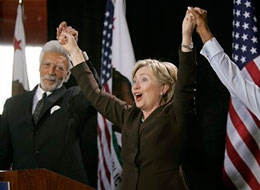 Presidential candidates aren't just competing for money and votes on the road to the White House. They are also battling for the support of the most influential celebrities and political officials. Perhaps more than they should be.
Presidential candidates aren't just competing for money and votes on the road to the White House. They are also battling for the support of the most influential celebrities and political officials. Perhaps more than they should be.
Political endorsements are the window dressing of presidential politics. They can give candidates credibility within certain groups or on specific issues. They can also generate media buzz and fundraising efforts (see: Oprah Winfrey and Sen. Barack Obama). But when it comes to the actual effect of an endorsement on the political process - like, say, bringing out the vote - the rubber rarely meets the road.
According to a recent Pew Research Center Survey, "most Americans say endorsements by celebrities and other well-known figures... would not affect their voting decisions." Yet candidates compete for them as if they were the ticket to electoral success. And emails touting the obscure city councilman who is weighing into the 2008 fray fill in-boxes like spam.
"Endorsements are the most overblown, over-hyped element of the campaign," Stuart Rothenberg, editor of the Rothenberg Political Report, told the Huffington Post. "And I am sick of these campaigns sending out these really dumb press releases about who's supporting who."
The endorsement battles - much like efforts to raise money - are usually self-fulfilling prophecies. The frontrunner secures the most support often because he or she is the surest bet. According to the D.C.-based paper, The Hill, 66 members of Congress are endorsing Sen. Hillary Clinton, D-NY compared with 27 for Sen. Obama and 14 for former Sen. John Edwards. On the Republican side, former Gov. Mitt Romney, despite never having worked in Washington, leads all contenders with 31 members of Congress supporting his campaign, compared with 28 for Sen. John McCain, R-AZ, and 22 for former New York City Mayor Rudy Giuliani.
"If you are the endorser you like to go with a winner," Sarah Binder, a Senior Fellow in Governance Studies at the Brookings Institution, told the Huffington Post. "You don't want to throw it on the wrong person. You want to be a player and you try to figure out who opinion is going to coalesce behind."
But if political endorsements serve to reinforce the electoral status quo they can also, on occasion, provide comic relief if not a public relations hindrance. Clinton, for one, has received the verbal backing of such social pariahs as O.J. Simpson, Larry Flint, and Jenna Jameson. Romney was forced to distance himself from one of his top backers in the Senate, Larry Craig. Giuliani had to deal with the prostitute-seeking exploits of his Senate endorser, David Vitter. And McCain has seen the co-chairman of his Florida campaign, Bob Allen, resign after being charged with soliciting an undercover male police officer.
So what purpose - besides holding the potential for a political headache - do endorsements serve? There are at least three functions cited by insiders.
The first is to shore up a candidate's bonafides on a specific issue. Sen. Chris Dodd, D-CT, received a boon for his campaign when the International Association of Firefighters gave him its support. Obama, meanwhile, addressed questions about his foreign policy experience by bringing on board Zbigniew Brzezinski, President Carter's national security adviser.
Endorsements also help build infastructure on a local level. In Iowa, with a caucus system that rests heavily on on-the-ground politiking, having a prominent advocate can be as important as deep campaign coffers. In the 2004 primary, Sens. John Kerry and Edwards were able to shoot past presumptive favorite Gov. Howard Dean in large part because of local endorsers.
"Finding a caucus goer is like finding a needle in a haystack," Iowa House Majority Leader Kevin McCarthy, a Sen. Biden supporter, told the Huffington Post. "The Democratic Caucus is not about bodies in place, but having that right organization in the precinct to get a share of the delegates. Endorsements help with that."
Finally, endorsements allow candidates to take on a competitor's perceived strength. Clinton scored points against Obama by bringing into her camp influential African-American figures like Oakland Mayor Ron Dellums and, just this Friday, longtime Georgia congressman John Lewis. Edwards, meanwhile, put out a press release touting the prominent women who supported his campaign shortly after his wife Elizabeth proclaimed him a better advocate for women's issues than Clinton.
And yet, if you combined the benefits of a political endorsement, some political observers claim, it still doesn't add to much. Rather than figuring out who in the 2008 race is winning the endorsement battle, they say, we should be asking: Who cares?
"The only thing that matters are endorsements that bring real support, and that only happens on the ground in places like Iowa and New Hampshire," said Rothenberg. "But even then, endorsements really matter when voters don't know the candidates, and that just isn't the case in this race."